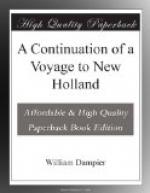The Chinese trade hither from Macao; and I was informed that about twenty sail of small vessels come from thence hither every year. They bring coarse rice, adulterated gold, tea, iron, and iron tools, porcelain, silks, etc. They take in exchange pure gold, as it is gathered in the mountains, beeswax, sandalwood, slaves, etc. Sometimes also here comes a ship from Goa. Ships that trade here began to come hither the latter end of March; and none stay here longer than the latter end of August. For should they be here while the north-north-west monsoon blows no cables nor anchors would hold them; but they would be driven ashore and dashed in pieces presently. But from March till September, while the south-south-east monsoon blows, ships ride here very secure; for then, though the wind often blows hard, yet it is offshore; so that there is very smooth water, and no fear of being driven ashore; and yet even then they moor with three cables; two towards the land, eastward and westward; and the third right off to seaward.
As this is the second place of traffic so it is in strength the second place the Portuguese have here, though not capable of resisting a hundred men: for the pirates that were at the Dutch fort came hither also; and after they had filled their water and cut firewood and refreshed themselves, they plundered the houses, set them on fire, and went away. Yet I was told that the Portuguese can draw together five or six hundred men in twenty-four hours time, all armed with hand-guns, swords and pistols; but powder and bullets are scarce and dear. The chief person they have on the island is named Antonio Henriquez; they call him usually by the title of Captain More or Maior. They say he is a white man, and that he was sent hither by the viceroy of Goa. I did not see him; for he lives, as I was informed, a great way from hence, at a place called Porta Nova, which is at the east end of the island, and by report is a good harbour; but they say that this Captain More goes frequently to wars in company with the Indians that are his neighbours and friends, against other Indians that are their enemies. The next man to him is Alexis Mendosa; he is a lieutenant, and lives six or seven miles from hence, and rules this part of the country. He is a little man of the Indian race, copper-coloured, with black lank hair. He speaks both the Indian and Portuguese languages; is a Roman Catholic, and seems to be a civil brisk man. There is another lieutenant at Laphao; who is also an Indian; speaks both his own and the Portuguese language very well; is old and infirm, but was very courteous to me.




